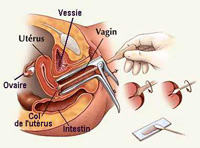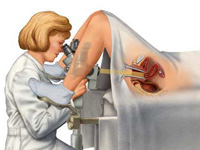عربي Welcome To Sphinx Cure Oncology Center
Being committed to the duty of Cancer prevention, The Center offers a number of selected educational video
materials to aid the concerned to understand more about Oncology.
Education can help ease the anxiety of the unknown.
It can help debunk the many myths people are told by
well-meaning friends and family.
Moreover, we feel strongly that an educated patient is better able to advocate for themselves.
They are
better prepared to care for themselves at home, manage side effects, and safely go through treatment.
 A Pap smear (Pap test) is a test of a sample of cells taken from a woman's cervix.
A Pap smear (Pap test) is a test of a sample of cells taken from a woman's cervix.
The test is used to look for changes in the cells of the cervix that show cervical cancer or
conditions that may develop into cancer.
It is the best tool to detect precancerous conditions and hidden, small tumors that may lead to
cervical cancer.
If detected early, cervical cancer can be cured.
Pap screen testing should begin at age 21.
Routine screening is recommended every two years for women 21-29 years old.
For certain women 30 years and older who have had three consecutive normal screening test results,
testing can be done every three years.
The Pap smear is done during a pelvic exam. A doctor uses a device called a speculum to widen the
opening of the vagina so that the cervix can be examined.
A plastic spatula and small brush are used to collect cells from the cervix. After the cells are
taken, they are placed into a solution.
The solution is sent to a lab for testing.
A Pap smear is not painful, but the pelvic exam may be a little uncomfortable.
A normal Pap smear means the cells from the cervix look normal.
An abnormal Pap smear means the cells do not look normal. Sometimes repeat Pap smears are
needed.
Different tests also may need to be done, such as a colposcopy (the use of a special microscope
to examine the cervix and vagina).
An abnormal Pap smear does not necessarily mean that cancer cells were found during the examination.
There are many causes for abnormal Pap smear results. Your doctor will evaluate the results to
determine if further testing is necessary.
A repeat Pap smear may be necessary if you had an infection at the time of the test or if there were
not enough cells collected during the test.
Since decreased levels of the female hormone estrogen also can influence Pap smear results,
menopausal women may need to take estrogen before they repeat the test.
If the results of the repeat Pap smear are still abnormal, your doctor may recommend that you have a
colposcopy to further evaluate the problem.
 Colposcopy is a gynecological procedure that illuminates and magnifies the vulva, vaginal walls, and
uterine cervix in order to detect and examine abnormalities of these structures. The cervix is the
base of the womb (uterus) and leads out to the birth canal (vagina). During colposcopy, special
tests [acetic acid wash, use of color filters, and sampling (biopsy) of tissues] can be done.
Colposcopy is a gynecological procedure that illuminates and magnifies the vulva, vaginal walls, and
uterine cervix in order to detect and examine abnormalities of these structures. The cervix is the
base of the womb (uterus) and leads out to the birth canal (vagina). During colposcopy, special
tests [acetic acid wash, use of color filters, and sampling (biopsy) of tissues] can be done.